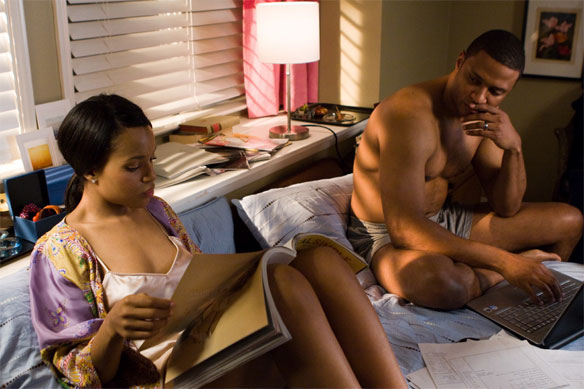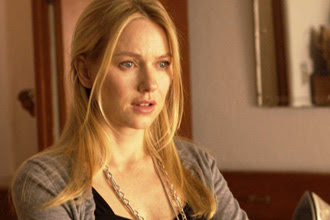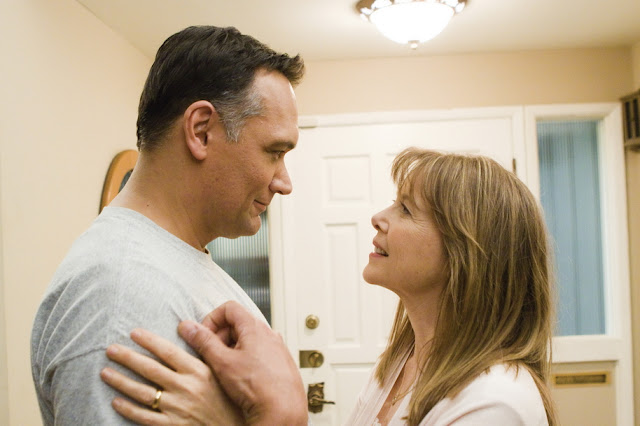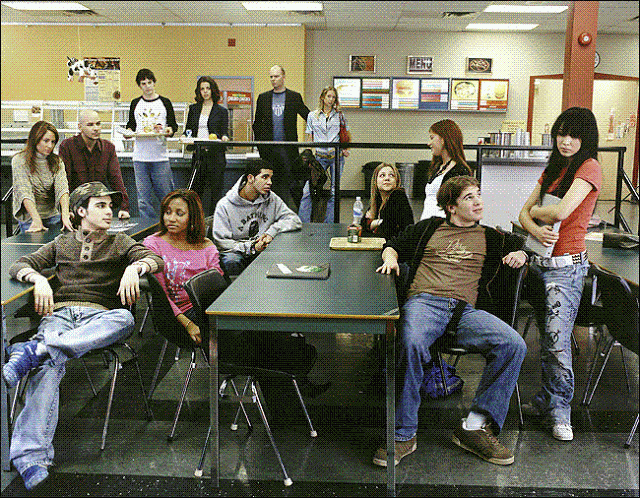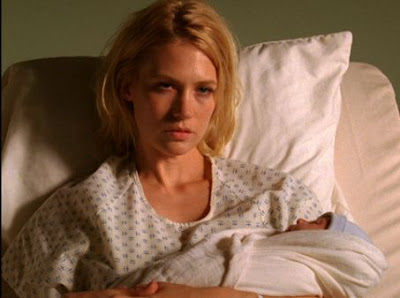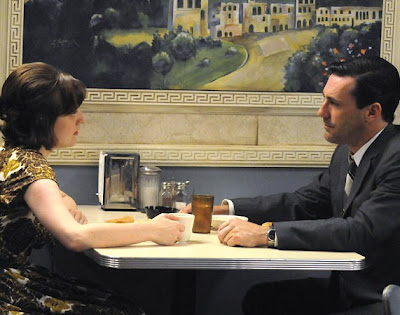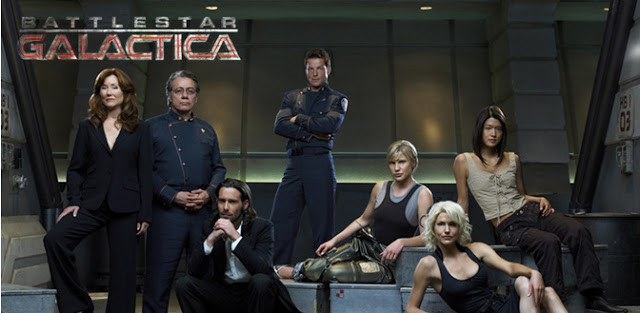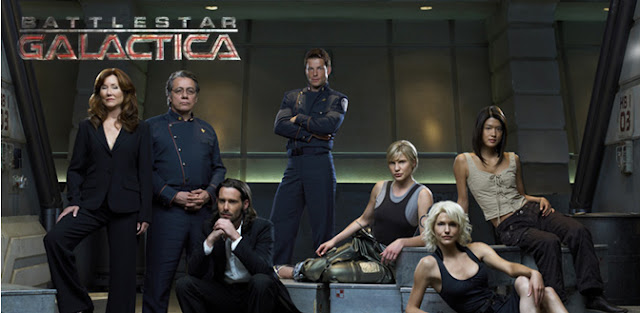 |
| The cast of Battlestar Galactica |
This is a guest review by Leigh Kolb.
“All of this has happened before, and all of this will happen again.”
The opening credits of each episode of Battlestar Galactica, which aired from 2004 – 2009, set the premise for the plot: “The Cylons were created by man. They evolved. They rebelled. There are many copies. And they have a plan.” During a few episodes later in the series, the plight for humans’ survival is highlighted with the announcement: “The human race. Far from home. Fighting for survival.” Most of the beginning credits also show the population tally, which dwindles after each battle. President Laura Roslin says at the beginning of their journey, “The human race is about to be wiped out. We have 50,000 people left and that’s it. Now, if we are even going to survive as a species, then we need to get the hell out of here and we need to start having babies.”
When a society is thrust into time of struggle and chaos and its existence is threatened, reproductive rights and bodily autonomy are among the first rights to be taken away by those in power. Battlestar Galactica shows us, as good science fiction does, the moral struggles we face now, and what they might look like in the future.
There are moral issues at stake throughout the entire series, including the erosion of prisoners’ and laborers’ rights so that others may live more comfortably. The same critical lens is cast on forced birth, forced abortion, eugenics and abortion restrictions.
Early in the second season, Kara “Starbuck” Thrace has returned to Cylon-occupied Caprica (home planet for the crew of Battlestar Galactica) to find her destiny and aid the resistance, a group of humans who have stayed behind to fight the Cylons. She is kidnapped and knocked out, and wakes up in a hospital bed. Her “doctor” (who later is revealed as a Cylon) tells her she was shot in the abdomen and they have removed the bullet. As she drifts in and out of consciousness, she becomes suspicious. The doctor has excuses for every inconsistency. He tells her they’d operated because they suspected she had a cyst on her ovary. He says, “You gotta keep that reproductive system in great shape… it’s your most valuable asset these days. Finding healthy childbearing women your age is a top priority for the resistance. You are a very precious commodity to us.”
Starbuck replies, “I am not a commodity. I’m a viper pilot.”
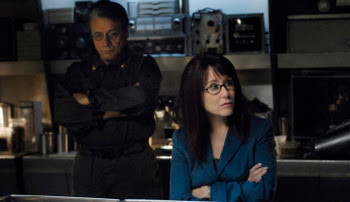 |
| Admiral William Adama, left, and President Laura Roslin |
He persists, and finally says, “The human race is on the verge of extinction. Potential mothers are a lot more valuable right now than a whole squadron of viper pilots.” He keeps pushing her into more vulnerable territory by bringing up old scars that suggest she was abused, and perhaps that’s why she’s afraid to have children. This pushes Starbuck over the edge and she screams at him to get out.
Her reproduction has become a commodity; it takes precedence over anything that she might be as an individual. When she pushes back against these ideas, she’s made to feel shame and vulnerability, as if that will guilt her into wanting to procreate. This philosophy is consistent among anti-abortion groups—if women are perceived as too strong, independent and resistant to motherhood (as Starbuck certainly is), they simply need to be coerced into realizing the importance of that goal. It’s their responsibility to mother more than anything else.
When she wakes again, she has a new scar and the doctor tells her “We’re just about done with you, Starbuck.” He attempts to put her back under, but she has removed the IV—she’d never told him her handle was Starbuck. She stumbles out of the room—the hospital used to be a mental institution, which begs the audience to consider the implications of maternity and captivity—and overhears the doctor and a Cylon talking about her ovaries, suggesting that her eggs had been harvested or were about to be.
Eventually she kills the doctor, takes his keys and stumbles into a room full of drugged, barely conscious women with their knees up and machines and tubes coming out from under their hospital gowns. She recognizes a friend from the resistance, Sue-Shaun, and tries to start freeing her from the machinery. Instead, she begs Starbuck to kill the power. “It’ll kill you,” Starbuck says, but Sue-Shaun pleads, “I can’t live like this—they’re baby machines. Please. Please.” Starbuck takes a surgical instrument and smashes the power supply; sparks fly, and the women die.
Sharon, a Cylon who has joined ranks with the resistance after falling in love and becoming pregnant with Helo, another viper pilot, informs Starbuck that this was one of the Cylons’ Farms, where human women were taken and inseminated to attempt a human/Cylon breeding program, which hadn’t yet been successful. The Cylons had failed to reproduce naturally, so they were finding other means. Sharon says, “Procreation is one of God’s commandments—be fruitful.” Starbuck fires back that “raping women” is what they’re doing, and Sharon defensively counters that love was the missing component, since she and Helo have successfully become pregnant.
Sue-Shaun’s insistence that the power be shut off, thus killing every woman-turned-incubator, further shows the lengths that women will go to resist reproducing unwillingly. Sharon’s insistence that if love were in the equation, and if a Cylon and human were “set up,” like she and Helo were, that the forced reproduction would somehow be more palatable, shows the ideology that allows these atrocities to be committed—procreation above all. It’s what God wants.
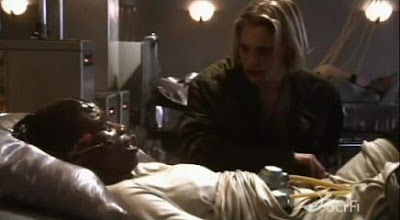 |
| Starbuck “rescues” Sue-Shaun from forced reproduction |
All Starbuck wants to do at this juncture is get a raider ship and liberate every Farm—but she’s reminded this is not her destiny. The women, the audience sees, will have to wait. Because while procreation is so important to a threatened species that women’s bodily autonomy and choice can be set aside, righting those wrongs are not among the first priorities.
Later in season two, there is much turmoil surrounding the Sharon and Helo’s pregnancy. Back on Battlestar Galactica, Sharon is in a holding cell because she is a Cylon. President Laura Roslin, who is on her deathbed (she was diagnosed with advanced breast cancer before the attack), orders that Sharon’s baby be aborted after Dr. Cottle tells her that there are some genetic abnormalities showing up in the fetus. Dr. Gaius Baltar disagrees (for self-serving, political reasons). Roslin says, “Allowing this thing to be born could have frightening consequences for the security of this fleet—I believe the Cylon pregnancy must be terminated before it’s too late.”
As Admiral Adama and the men around her question her decision, she remembers something Caprica’s former president said to her and says, “The interesting thing about being president is that you don’t have to explain yourself to anyone” (most certainly a reference to the same quote attributed to President George W. Bush). She is in control, and will use that control over another woman’s body because, being half-Cylon, the fetus is “the other,” and represents the enemy.
As Adama tells Helo the abortion must take place, Helo asserts, “We’re talking about a child—a part of me. I guess it’s easier to kill when you call it a Cylon.”
Sharon reacts with anger and rage, screaming “Let them try and take my baby” to Helo before she starts banging her head bloody into the thick glass keeping her separated from the rest of the fleet. Armed guards come to get her and she uses her chair as a weapon, and they must hold her down and sedate her.
As Sharon is wheeled into the medical unit for the procedure, Baltar bursts into the room saying that the fetal bloodwork has a resistance to disease, and seems to kill cancer cells on contact. Instead of receiving an abortion, blood is drawn from Sharon’s fetus and injected into Roslin. Roslin seizes as Sharon gazes at her from her nearby bed—as Roslin comes to and instantly heals, she and Sharon make eye contact. Two women, utterly in control of one another’s futures.
The cancer is gone. The half-Cylon, half-human is safe.
Back in her holding cell, Sharon’s belly has grown larger, and she strokes her much-wanted future child lovingly. Roslin sees her, and has a pained look on her face.
Again, power, fear and desperation lead those who can to make decisions for other people, especially when those people are “the other.” Procreation is necessary and blessed, unless it’s not.
And just as Sue-Shaun was willing to die instead of mother without her consent, Sharon was willing to kill before losing the baby she wanted.
Later in the series, Sharon’s baby will be taken from her again and, while she has been told the baby is dead, given away to another couple to raise. Starbuck will be haunted by who she’s made to believe is her little girl from her egg harvest, and she’s thrust into a (false) motherhood and personal turmoil. The choices they did not get to make tear them from the life they desired.
Toward the end of season two, after the audience has been presented with the reproductive issues of attempted forced births and abortion, the question of choice in the face of societal turmoil is posed. A stowaway teenager has made it on to Galactica from her colony of Gemenon, where abortion is illegal. Cottle tells Adama that he performs abortions for women: “I do my work, she leaves, I don’t ask a lot of questions.” “You’re going to start,” says Adama, who has been contacted by the frantic parents of the missing young woman.
The young woman says, “It doesn’t matter what you say, I’m not going to change my mind,” and then begs them to not send her back, because she is afraid of her parents and the fundamentalist religious rules of her colony—she wants asylum on Galactica.
“Some might say,” says Cottle, “she was the victim of political persecution.”
Adama glares at him, and the doctor walks away.
As is so often the case in matters of reproductive decision-making, the doctor is pushed out of the picture because of politics.
The colonial representative from Gemenon, Sarah, comes to Roslin to plead for the young woman. She says that abortion “is an abomination in the eyes of the gods” and threatens to remove support for Roslin’s campaign unless the young woman is released back to Gemenon.
Roslin is strong in her convictions (at first) that abortion was legal in the Colonies, and it must be legal still. “I’ve fought for woman’s right to control her body my entire career,” she says, clearly struggling with the tension of political and seemingly practical ramifications of her orders.
As she makes these assertions, the white board with 49,584 written on it looms behind her. The population, Adama reminds her, is a consideration, and reminds her that she herself had said, “We’d better start having babies.”
Roslin researches demographics, and Baltar tells her that if humans continue on their present course, they would be extinct in 18 years.
The audience then hears Roslin’s voice at a press conference making a radio address, saying that while people have enjoyed the rights and freedoms they had before the attack, “One of those rights is in direct conflict with the survival of the species.” The pregnant teenager touches and looks down at her swollen abdomen as Roslin says, “We must repopulate the fleet.” She then announces that she’s making an executive order that “anyone seeking to interfere with the birth of a child—mother or medical professional—will be subject to criminal charges.”
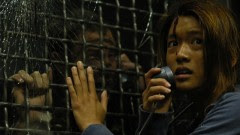 |
| Sharon reacts violently to the news that her fetus will be aborted without her consent |
However, before the executive order is in place, Roslin is sure that the Gemonese teenager is granted an abortion and asylum.
When Sarah confronts Roslin with this information, she says “Word has it you’re not going to prosecute the Gemonese girl.” Exasperated, Roslin says, “She has a name, Sarah—I think she’s suffered enough… Take your victory and move on.”
Another press conference, another political power play by Baltar on Roslin, and we come full circle again—women’s reproductive rights reduced to a political wedge, to keep support, win voters, and attempt to repopulate the fleet. It’s not about the woman.
Nor is it in 2012 America, on Earth, far away from the notion of battleships and humanoid machines.
While America is still in the throes of economic decline, already in 2012 944 reproductive health and rights provisions have been introduced by legislatures, including many that restrict access to abortion and contraception. Much of the rhetoric used by anti-abortion and anti-contraception factions (like the monotheistic Cylons) includes the ideology that women should be mothers, should embrace motherhood and fulfill their purpose as a procreating species.
At the same time, the US has a legacy of eugenics and sterilization. Even as recently as 2011, a Louisiana lawmaker proposed legislation that would give incentives to poor women to be sterilized. He also has proposed a ban on all abortion—again showing that reproduction is beautiful and necessary—unless the state says otherwise. Modern society is also no stranger to forced adoptions.
The Cylons, throughout the series, demonstrate a monotheistic religion that has similar rhetoric to fundamentalist Christianity. On the other hand, the Colonies are polytheistic—seemingly more progressive and inclusive, having legalized abortion. President Roslin is clear in her personal struggle to make decisions that go against a lifetime of pro-choice activism. Eventually, though, the rhetoric all converges. Women must reproduce for the greater good. Their individual autonomy must be put aside for the fleet, for God/the gods, for politics and for others to live.
At the end of the opening credits of Battlestar Galactica, there is an intense teaser reel of what was coming up in the episode. We would always close or eyes, or look away from the screen, because we didn’t want to see what was coming. It’s easy to do that with every issue that science fiction and dystopian fiction bring before us—look away, because we don’t want to know what’s coming. In reality, these political and moral dilemmas are not taking place in some star system light years away; they are taking place here. They are taking place now.
———-
Leigh Kolb is an English and journalism instructor at a community college in rural Missouri, and has an MFA in creative nonfiction writing. She lives on a small farm with her husband, dogs, chickens, and garden, and makes a terrible dinner party guest because all she wants to talk about is feminism and reproductive rights.






